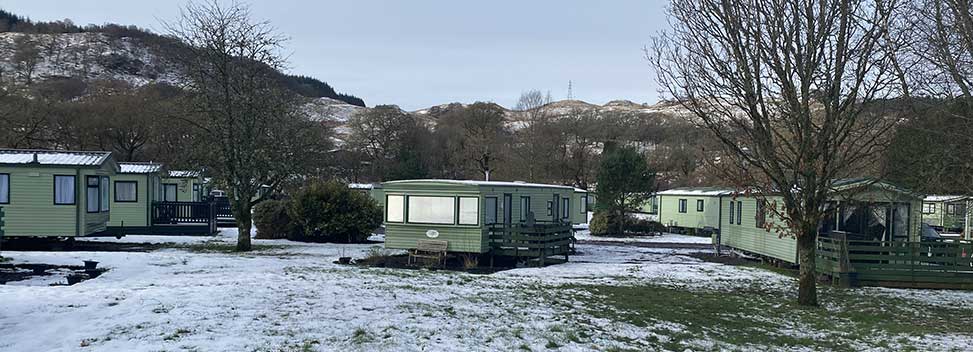How to winterise your static caravan

Preparing your static caravan for winter
Not sure how to shut down a static caravan for winter? You're in the right place. At Intasure, we're insurance specialists for static caravans and offer cover for holiday homes of all types. We've learned a lot about their care and maintenance over the years. So, here's our at-a-glance guide. on how to winterise your static caravan.Drain down your static caravan
Draining down is an important task to complete before leaving your caravan for the winter. In fact, it's so vital that we've created a guide to draining down your static caravan. Even one cold snap while you're away might result in water left in the water system freezing. Frozen pipes could lead to burst pipes, causing flooding and lots of mess.Disconnect the gas and electricity
If your static caravan has a mains-connected gas supply, shut it off at the main valve to prevent leaks while the caravan is unoccupied. If you use bottled gas, turn off the supply, disconnect the bottles and store them inside your caravan. This can help to prevent any gas leaks. You should also turn off all electrical switches, unplug all appliances, and then switch the power off at the mains.Clean and empty your caravan
Carrying out a deep clean, before you leave, will help to minimise the risk of returning to unpleasant smells and growths. It's vital to remove all traces of food and drink. even a small crumb or sticky stain can rot and become unhygienic over time.Keep your caravan dry over winter
Mould and mildew can quickly develop and spread unless carpets, curtains and upholstery are thoroughly vacuumed and kept dry. Wondering how to stop condensation in a static caravan? A simple and effective method is to leave open containers of salt around the interior. The salt absorbs moisture in the air.Keep out insects and vermin
Inspect your static caravan for holes, loose joints, or gaps, cover all plugholes, and close toilet lids. Vermin and insects only need a small opening to get in and settle over winter.Remove everything you can and secure what you can't
Take your valuables and electrical appliances home, including TVs, hi-fi equipment, games consoles and computers. All bedding and soft furnishings should go home with you for the winter to keep everything in the best condition, and help to prevent them from becoming damp and mouldy. Keeping them in sealed vacuum bags is an alternative if you haven’t got space in your car.Air your static caravan before closing up
Open all doors and windows for a while, to allow fresh air to circulate through your caravan. Leave internal doors, cupboards and drawers open and move furniture into the middle of each room so air can circulate. Leave the door of your empty, fridge open as well. Be sure to lock all doors and windows before leaving, as failing to do so could void your insurance policy, should you need to make a claim.Protect the exterior of your static caravan
The exterior of your static caravan may be exposed to the worst weather winter can throw at it, so it also needs to undergo thorough preparation. Here's the exterior ‘to do’ list for winterising your static caravan:- Clean the gutters. Debris may cause blockages and overflows, which could lead to leaks, corrosion or water ingress.
- Store outdoor furniture away to help ensure it’s in the best possible condition when you return.
- Check the caravan seals, as a tiny crack could let water in over a prolonged period.
- Inspect the exterior for holes, gaps and loose joints that need filling.
Inform the park and check your insurance
The people who run your holiday park need to know that you've left for the winter and, if possible, when you're planning to return. It's also important to check that your insurance provides suitable cover for an empty static caravan during the winter weather. At Intasure, we'll be delighted to help if you're ready to renew or need additional cover. We offer insurance policies for different types of caravans, which can include theft, damage, personal accident, and loss of use cover. We’re here to help with your caravan insurance, whether you use it for family holidays, weekend breaks, residential use, or holiday rentals. Get a quote online or call us on 0345 111 0680 for more details, today.The sole purpose of this article is to provide guidance on the issues covered. This article is not intended to give legal advice, and, accordingly, it should not be relied upon. It should not be regarded as a comprehensive statement of the law and/or market practice in this area. We make no claims as to the completeness or accuracy of the information contained herein or in the links which were live at the date of publication. You should not act upon (or should refrain from acting upon) information in this publication without first seeking specific legal and/or specialist advice. Arthur J. Gallagher Insurance Brokers Limited trading as Intasure accepts no liability for any inaccuracy, omission or mistake in this publication, nor will we be responsible for any loss which may be suffered as a result of any person relying on the information contained herein.
